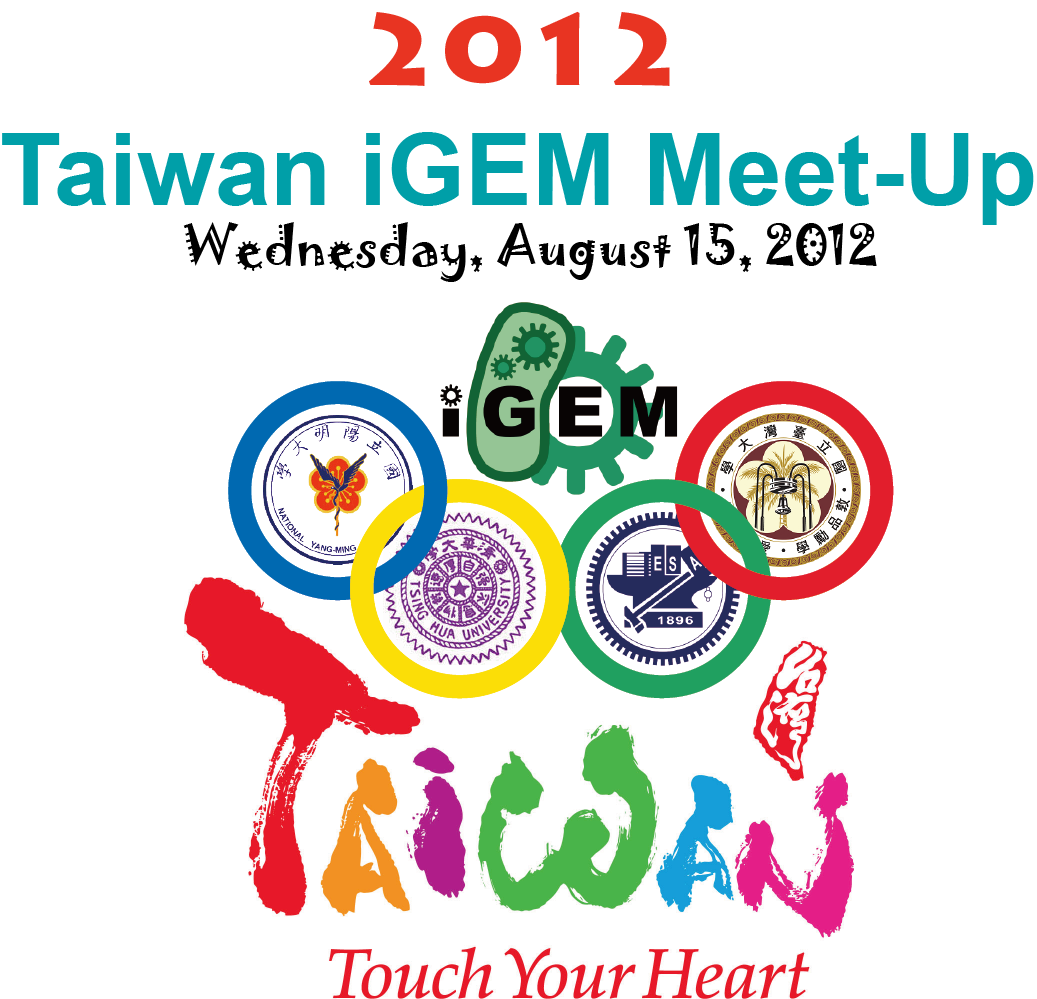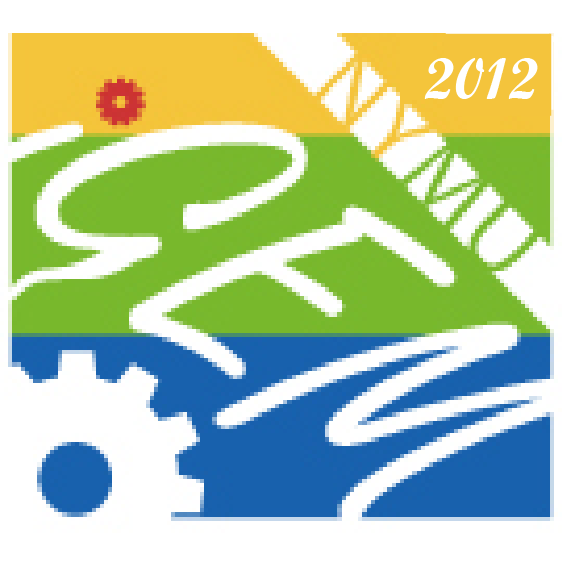Team:NYMU-Taipei
From 2012.igem.org
Welcome to our Campus !
Founded in 1974, National Yang-Ming University, formerly known as National Yang-Ming College of Medicine, has been adhering to the school motto of "benevolent mind and art, putting knowledge into practice" while training excellent humane doctors to provide service by solving medical problems in remote and rural areas.
Our success is no coincidence but an attribute of excellent allocation of limited resources and the devoted efforts of both the faculty and students, all of which were needed to achieve "brilliant results in teaching and research" within such a short period of time. Due to our research atmosphere, academic accomplishments, innovative knowledge and cultivation of talent, we have well demonstrated our standing as a top university.
Our iGEM Project:* Nitrogen Metabolism
|
Responses to Safety Questions
1. Would any of your project ideas raise safety issues in terms of:
- researcher safety,
- public safety, or
- environmental safety
- Our Response:
- Our projects are mainly associated with pollutent reduction and endosymbiosis. For discussing the safety issues connected with our project, this assessment will start by listing the organisms and biobricks we used and developed in compliance with the guideline of iGEM Safety page correspondingly.
- The following organisms are species which we derived our biobricks from or practiced transformation and cloning. This list includes Desulfovibrio desulfuricans, Pseudomonas aeruginosa PAO1, Dictyostelium discoideum, Escherichia coli, Synechococcus elongatus PCC7942, Synechocystis sp. PCC6803 and Synechococcus sp. PCC7002. None of the listed organisms is a pathogen. As for the biobricks we used, most of them are bioparts from previous iGEM teams. These parts from iGEM kits are considered safe.
- Since our project is related to contaminant water, exhaust air and heavy metal in environments, we need to thoroughly examine every process of the experiments we conduct. Under the strict guidance of our faculty instructors, all transmissions and operations of biological materials meet the relevant laws and regulations. As a result of the heartily suggestion and assistance of our laboratory fellows, we developed a series of experiments to demonstrate our project without violating any national regulations or university guideline requirements. The details of our experiments are available on the Experiment page.
- Our projects are mainly associated with pollutent reduction and endosymbiosis. For discussing the safety issues connected with our project, this assessment will start by listing the organisms and biobricks we used and developed in compliance with the guideline of iGEM Safety page correspondingly.
2. Do any of the new BioBrick parts (or devices) that you made this year raise safety issues? If yes,
- Did you document these issues in the Registry?
- How did you manage to handle the safety issue?
- How could other teams learn from your experience?
- Our Response:
- There are not any new BioBricks we made raise safety issue. They are mainly reductases from organisms mentioned above. Nitrate, nitrite, nitrous oxides reductase and derived from Pseudomonas aeruginosa PAO1. Thanks to Prof. Hwan-You Chang from National Tsing Hua University, we operated the transferring and cloning on purified genomic DNA provided from his lab. Therefore, we did not need to cultivate P. aeruginosa PAO1. The biobricks related to nitrogen reductase are ultimately transfected onto the genome of Synechococcus sp. PCC7942, and all of the according procedures followed the strict regulations of BSL 1 (Basic Biosafety Level 1). The same operation standard (BSL 1) is also applied to our experiments of the sulfate reducing enzymes derived from P. aeruginosa PAO1 as well. In addition, the sqr (sulfide quinone reductase) from Synechococcus sp. 7002, and like other biobricks mentioned above, is expressed in Synechococcus PCC7942 following the same safety requirements too.
- The other new biobricks we made includes zinTp, the promoter whose activity is induced by cadmium ion; and mnt protein, the ion transporter that pumps cadmium ions inside bacteria. These genes have no harm to either human being or the environment.
- Since there is little safety concern according to the properties of our new biobricks, we deduced that the new biobricks we submitted are safe and harmless.
3. Is there a local biosafety group, committee, or review board at your institution?
- If yes, what does your local biosafety group think about your project?
- If no, which specific biosafety rules or guidelines do you have to consider in your country?
- Our Response:
- The Center of Environmental Protection and Safety and Health on our campus is in charge of promoting and managing the safety and health issue in National Yang-Ming University. The following links will direct you to the website which contains regulation guidelines of biological safety issues. [http://ces-e.web.ym.edu.tw/front/bin/ptlist.phtml?Category=5 The Center of Environmental Protection and Safety and Health - Biological Safety]. All the experiments we do or conduct in our projects are following the rules listed in there.
- Though most of our projects are considerably safe, one part of our projects involves in the manipulation of cadmium ions, which is restricted under the local regulations. With the help and advice of the Center of Environmental Protection and Safety and Health, we conducted our cadmium related experiments in accordance with the associated guidelines.
4. Do you have any other ideas how to deal with safety issues that could be useful for future iGEM competitions? How could parts, devices and systems be made even safer through biosafety engineering?
- Our Response:
- One of our projects specifically deals with biosafety issues related to the environment. Our Soil Cleaner project is mainly about collecting Cadmium from the environment, containing several interesting designs to avoid gene flow and limit the leakage of artificial organisms into the environment. We took advantage of using previous biobricks to make sure the engineered E. coli can only live inside of Dictyostelium discoideum, which avoids unwanted gene exchange between our engineered E. coli and other wild type bacteria.
- By cloning LLO and invasin genes into the E. coli cells, the bacteria can get into the amoeba and live inside there. Invasin helps the bacterial cells to be endocytosed by the amoeba host. Then Listeriolysin O makes the bacterial cells escaped from phagosomes in the cytoplasm of the amoeba host.
- In case that the E. coli cells get rid of amoeba, we designed a mechanism by using endolysin and holin to cause the death of bacterial cells. Endolysin is an enzyme that degrades the bacterial peptidoglycan cell wall, resulting in the lysis of the bacterial cells. Holins are small membrane proteins that let endolysin get to where it works. Anti-holin acts as anti-toxin by binding to holin, inhibiting it activity. We also used the regulation of a LuxR promoter, a promoter which will only express downstream genes when the protein LuxR and signal molecule AHL produced by protein LuxI, are both exist inside the bacteria, in this design. Engineering continual expression endolysin, holin and LuxR; and LuxR promoter as the promoter for anti-holin gene in E. coli, the bacteria will not survive without AHL. We clone the LuxI gene to the plasmid in Dictyostelium discoideum, making the amoeba to produce AHL. By this way, when E. coli stay in the amoeba, the AHL will be sensed by LuxR, maintaining the transcription of anti-holin gene, preventing the E. coli from lysis. But when the E. coli cells leave the amoeba, there will be no AHL so no anti-holin will be produced and then the E. coli will be killed by endolysin.
- As for constraining the Soil Cleaner in the contaminated area, a death switch is designed to restrict amoeba from migrating into nature. This kill-switch has two man-made operons. The first one includes zinTp promoter. This promoter activity is induce by cadmium ion; and its constructive gene is lacI. The other one includes BBa_R0010 promoter. This promoter whose activity is inhibited by the protein lacI; and the constructive genes are aifA and HlyA. AifA is a protein that causes the apoptosis of Dictyostelium discoideum cells. HlyA is a tag that sticks after the target protein. With this tag, E. coli will secrete the target protein. When cadmium ions exist, zinTp works and lacI is generated, so the expression of both aifA and HlyA is repressed. If there is no cadmium ions, BBa_R0010 will activate the expression of aifA and HlyA, so the protein aifA will be secreted right into the cytoplasm of amoeba, causing amoeba apoptosis.
- Moreover, instead of using traditional endogenous plasmids to transform cyanobacteria, we cloned our biobricks into vectors that will stably recombine with homologous genomic DNA alternatively. Thus, horizontal gene transfer is avoided and the security and safety of our project is greatly improved.
 "
"







